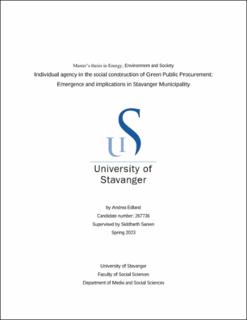| dc.contributor.advisor | Sareen, Siddharth | |
| dc.contributor.author | Edland, Andrea | |
| dc.date.accessioned | 2023-09-01T15:51:26Z | |
| dc.date.available | 2023-09-01T15:51:26Z | |
| dc.date.issued | 2023 | |
| dc.identifier | no.uis:inspera:153029635:97050156 | |
| dc.identifier.uri | https://hdl.handle.net/11250/3087092 | |
| dc.description.abstract | Given the urgent global climate challenges we face today, it is imperative for actors at all levels - international, national, and local - to take decisive action. In this context, green public procurement (GPP) emerges as a valuable environmental policy tool employed by public authorities. GPP involves the procurement of goods and services that have a reduced environmental impact compared to alternatives that serve the same purpose. This thesis examines the institutionalization of GPP at the municipal level through a case study of Stavanger Municipality in Norway. Concepts from institutional theory were used to deepen the understanding of the current situation of GPP in Stavanger. Expert interviews and document analysis, as well as a comprehensive examination of 32 tenders from six sectors, provide a broad empirical foundation that is used to gain an understanding of GPP at the municipal level. The findings reveal a disconnect between the municipality's ambitious emission targets and its actual actions, leading to a decoupling of commitments and behavior relating to climate and environmental efforts, including the strategic use of GPP. The analysis highlights the importance of individual competence and motivation in a complex institutional environment and suggests that leadership should invest in individuals with environmental expertise to accelerate sustainability transitions. By identifying weaknesses in current practices and opportunities for improvement, this study provides valuable insights into how GPP could be used more strategically to align with municipal environmental goals. | |
| dc.description.abstract | Given the urgent global climate challenges we face today, it is imperative for actors at all levels - international, national, and local - to take decisive action. In this context, green public procurement (GPP) emerges as a valuable environmental policy tool employed by public authorities. GPP involves the procurement of goods and services that have a reduced environmental impact compared to alternatives that serve the same purpose. This thesis examines the institutionalization of GPP at the municipal level through a case study of Stavanger Municipality in Norway. Concepts from institutional theory were used to deepen the understanding of the current situation of GPP in Stavanger. Expert interviews and document analysis, as well as a comprehensive examination of 32 tenders from six sectors, provide a broad empirical foundation that is used to gain an understanding of GPP at the municipal level. The findings reveal a disconnect between the municipality's ambitious emission targets and its actual actions, leading to a decoupling of commitments and behavior relating to climate and environmental efforts, including the strategic use of GPP. The analysis highlights the importance of individual competence and motivation in a complex institutional environment and suggests that leadership should invest in individuals with environmental expertise to accelerate sustainability transitions. By identifying weaknesses in current practices and opportunities for improvement, this study provides valuable insights into how GPP could be used more strategically to align with municipal environmental goals. | |
| dc.language | eng | |
| dc.publisher | uis | |
| dc.title | Individual agency in the social construction of Green Public Procurement: Emergence and implications in Stavanger Municipality | |
| dc.type | Master thesis | |
